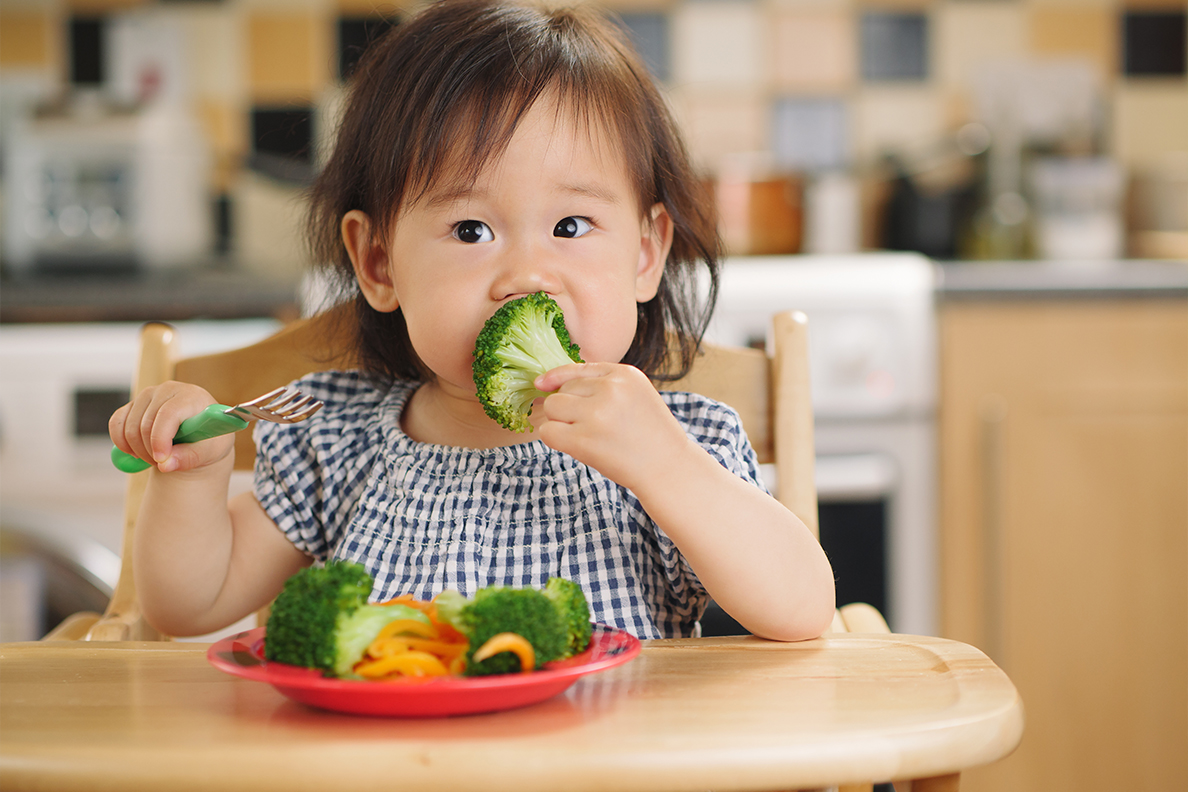
As your child continues to grow and develop, their daily needs will change right along with them. Take a closer look at what to expect during the toddler years when it comes to diet and nutrition.
You may feel a little concerned if your toddler seems to eat less than they did as a baby. But this is common and expected. After age 1, babies aren’t growing as fast, so they don’t need as much food. “Kids at this age tend to be very picky and eat a lot less than they did when they were younger, both because they are slowing down their growth rate and because they become mobile,” explains paediatrician Elham Raker, M.D.
If your little one scarfs down their lunch and asks for a third helping, but takes only a bit of banana for dinner, there’s no need to worry. Toddlers need roughly 1,000 calories per day, spread out over three meals and two snacks, but they tend to take it in varying amounts.
The important thing is to offer your toddler a variety of nutritious foods. This should include vegetables, fruits, proteins, starches, and healthy fats. Portions don’t need to be big—you may be surprised to learn that toddler serving is only about a tablespoon. “Do not worry about the quantity of food, just offer good quality food,” notes Dr. Raker.
To build healthy eating habits, you should decide what you are going to serve, and your child should decide which of the available foods they eat and how much. Try not to make food a big deal. If your toddler refuses to try a new food, say “OK,” remove the food, and then offer it again another time.
Milk and dairy products like cheese and yogurt are an important part of a toddler’s diet. But if your toddler hasn’t turned 2 yet, don’t reach for the low-fat milk. At age 1, babies still need full-fat dairy products to support their brain development.
If your toddler still loves their bottle, they might be in for a rude awakening. The AAP recommends that babies give up the bottle between 12 and 24 months to prevent tooth decay and to ensure that they don’t fill up on milk instead of eating enough food.
“Too much cow’s milk also inhibits iron absorption and may impact sleep,” explains Heather Wallace, a certified paediatric sleep consultant and postpartum doula, and the owner of BraveHeart consulting. “You want to stick to no more than 16 ounces of cow’s milk per day. But if your toddler won’t drink that much milk from their sippy cup, supplement by offering foods high in protein and healthy fats such as avocado, beans, eggs, cheese, greek yogurt, hummus, and tofu.”
When you do switch to a cup, you may find that your toddler drinks a lot less milk. This is pretty typical and it is not a cause for concern. Continue to offer unsweetened milk or water with meals and snacks. Skip the juice, which is high in sugar while lacking the fibre found in whole fruits.
Toddlers may love to explore different types of foods, but there are foods that pose a choking hazard that needs to be avoided. This includes whole carrots, cherry tomatoes, hot dogs, and grapes. Peanut butter can also be a choking hazard if eaten by the spoonful.
So, next time you’re whipping up a snack for your little one or planning their meals, remember to keep it colorful, keep it balanced, and keep it fun! After all, a healthy diet now sets the foundation for a lifetime of good eating habits and happy tummies. Here’s to nutritious bites and happy munching adventures with your tiny food critics!
___
Article Source: Very Well Family
Discovery Point Nursery and Academy is a daycare located in Woodbridge, Ontario.